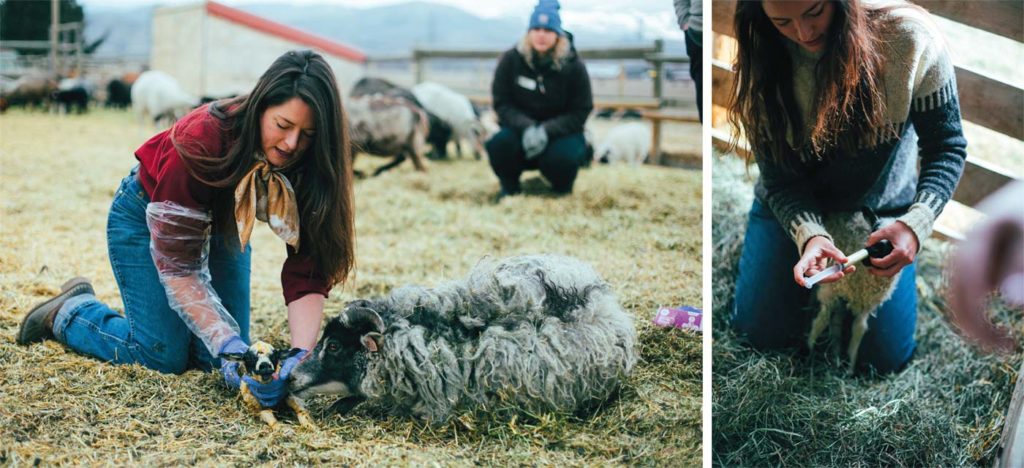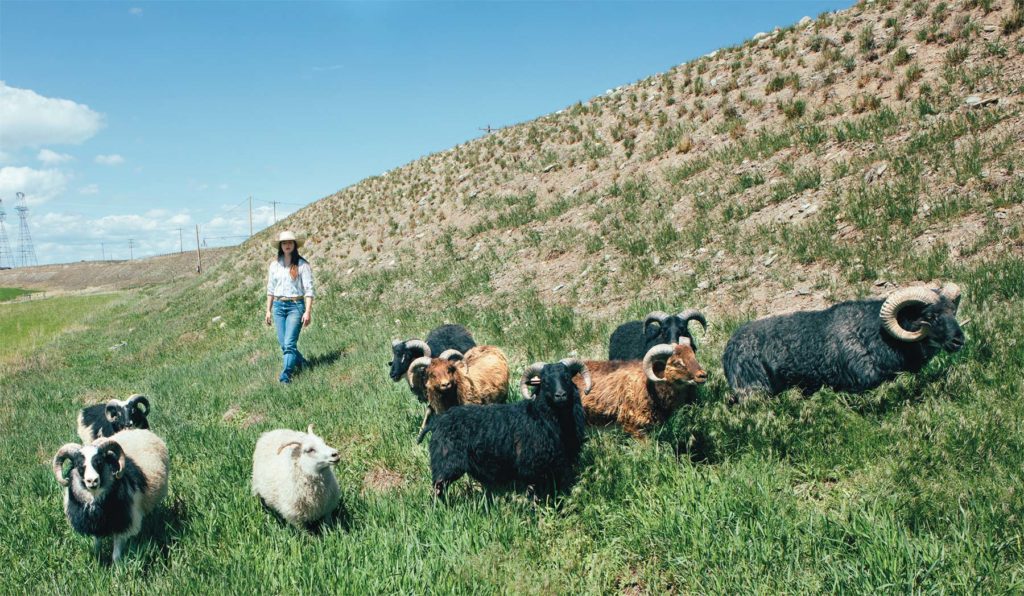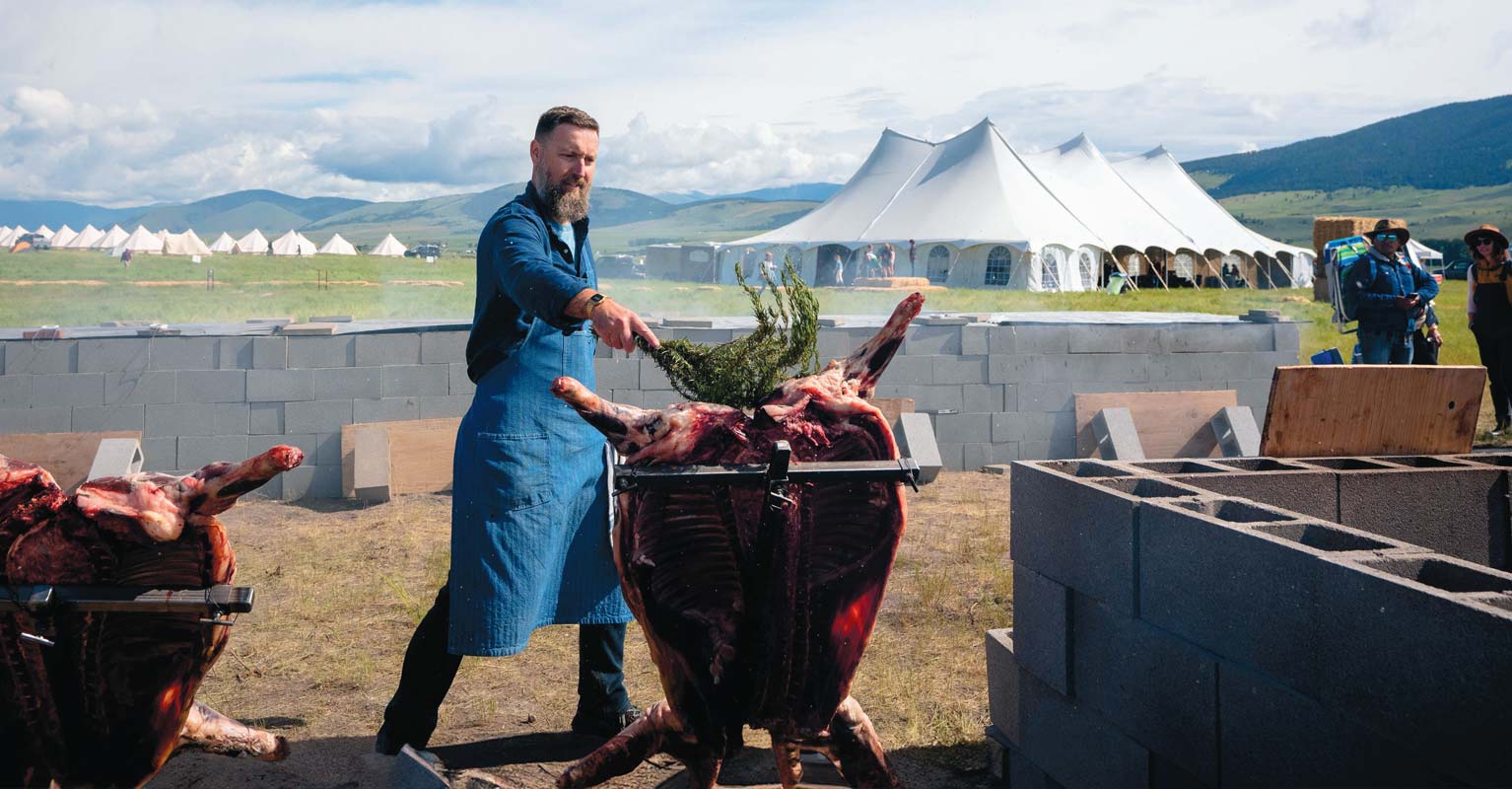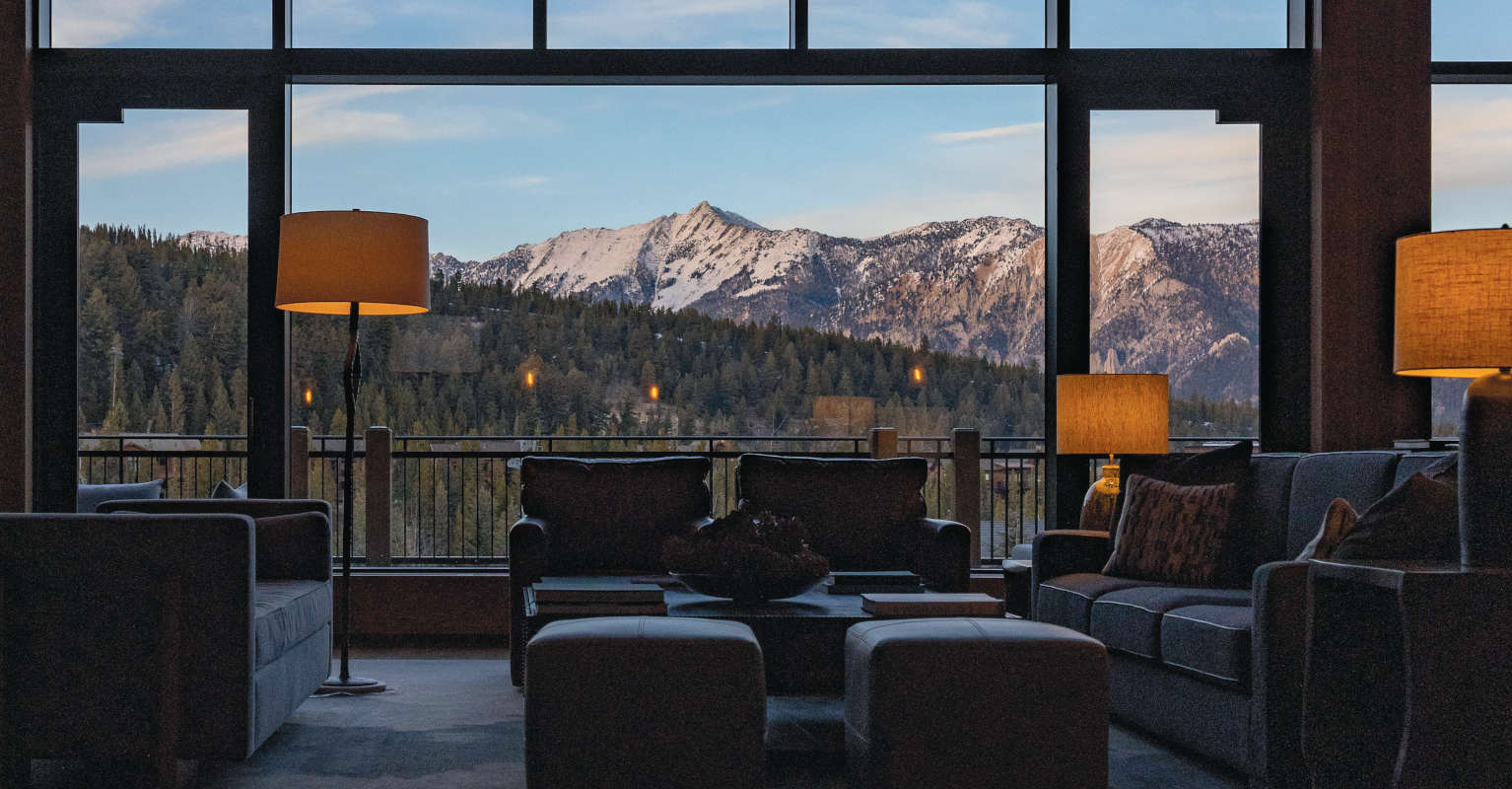Caroline Nelson, of Little Creek Lamb and Beef, takes stock of the steers being sorted at her mentor’s ranch in Townsend, Montana.
RISKS REAP REWARDS IN RANCHING
You can still smell the shampooed hair of the half dozen women who’ve just arrived from the airport in the tightly packed lambing pens of Little Creek Ranch in Townsend, Montana. Roller bags and carry-ons lie strewn on the gravel parking lot and thrown in backseats. Caroline Nelson, head shepherd and director of events for the weekend, along with fellow shepherd Lacey Carr of Bingen, Washington, crouch beside a laboring ewe.
“Something is not right,” Carr says as she pulls her gloved hand out of the ewe’s contracting birthing canal. Nelson furrows her brow and switches positions with Carr in the tight quarters.
“Yeah, this doesn’t look right,” Nelson agrees. The two women exchange a look, confirmation that this ewe is in trouble and needs expert attention immediately. Before long, the laboring mother is loaded in a trailer and whisked to the veterinarian for an emergency epidural and hard pull of her stillborn lamb.
To say this is how Nelson planned to kick off a four-day Shepherd Camp with six of her loyal Instagram followers would be laughable. Sure, they were promised something rough-and-tumble, but likely no one expected a lambing emergency right out of the airport gates.
Yet that seems to be just how Nelson’s life has progressed: leaning into calculated risks for the potential of a high reward. And sometimes that means jumping right into a gritty reality.
The ability to navigate risk-taking has set Nelson apart from the crowd. In 2020, she was chosen to represent the ranch community while presenting an award at the Emmys on national television. Magazines and newspapers have followed her progression in ranching along with a growing social media audience and customer base.

how to syringe feed a weak lamb.
“Comfort is such a false friend.” —Caroline Nelson
Though she’s not the first to dive into regenerative sheep ranching in rural Montana, currently claiming the title of head rancher of a growing flock of over 50 breeding ewes and a small herd of steers, she does have a unique backstory that may explain some of her broad appeal and comfort with risk.
Nelson grew up in Pennsylvania, where she was offered a brief glance at rural America but a largely guarded one with nannies and piano lessons followed by boarding school. The daughter of two college admissions counselors, she received a strict education and aimed straight for Princeton University.
“I don’t know exactly what [my parents] wanted me to be or do, but it wasn’t this,” Nelson tells me on a summer evening after rotating sheep from one grazing site to another.
This Ivy League anthropology major couldn’t forget the many summers she spent working as a ranch hand in Montana’s wild, open landscapes, where she washed dishes, branded cattle, and cinched saddles for a Townsend-based dude ranch. Her first summer there, at age 12, left a lasting impression on the sheltered youth. Nelson’s senior college thesis on cowboy culture sealed the deal.
“I think my path was really a rejection of that upbring,” Nelson says, referring to her life growing up with “all the things,” as she calls it.
But it would still be a few years before the rolling foothills claimed her as their own. After graduation, Nelson took her Western passion on the road and toured with a band as lead singer and guitarist under her birth name, Caroline Reese. Her music was nostalgic and her lyrics soulful. Not quite rock, not quite bluegrass, Caroline Reese and her band made their name at the intersection of the two, playing Americana folk music in bars and small venues across the country. Her leather fringe and cowboy hats were a long cry from Princeton’s ivy trellises.
Then, as so many country songs predict, Nelson was eventually pulled back to Montana by a boy. Well, that and a job. The boy came after. When the dirty bar tips lost their savor, Nelson wound her way back to the ranch where she’d worked summers as a kid. She slid right back into her old job throwing hay, sorting cattle, and completing every other odd job on the ranch, working 10–12 hours a day, seven days a week.
“There’s a lyric I love by Strand of Oaks that says, ‘Comfort doesn’t mean you’re better off,’ and I live like that,” Nelson says. “Comfort is such a false friend.”
In 2018, not long after moving in with her then-boyfriend Justin Nelson, a Facebook Marketplace ad popped up in her feed for four free Icelandic sheep. Nelson jumped at the opportunity to start her own flock and brought the ewes home. Little did she know she’d experience her first lambing season in just a few weeks as the new ewes were all expecting.
“I was picking rocks out in the corral, and I hear this little ‘baaa’ sound,” she reminisces with a smile and a laugh. “I run over to the sheep pen and there are two twin lambs running around. I was hooked. I was totally hooked.”
Not taking a moment to deliberate, Nelson posted to Instagram offering preorders for eight lambs’ worth of meat.
Within a couple weeks of that first lambing season, all of the meat boxes were sold and Little Creek Lamb & Beef was born.
“I think it’s a great idea to have a mission and just no idea how hard it’s going to be,” Nelson says of her journey into ranching for profit. “I think you have to be like that, otherwise it’s never going to happen.”
Despite enduring years as the butt of jokes at the town gas station as a shepherd in a cattle town, Nelson continues to build her brand and her business. She relies heavily on her ranching community for advice, support, mentorship, and expertise. Her former boss at the dude ranch where she once slung dishes and saddles remains a key figure in her life and the current means to off er beef in addition to lamb to her customers.
One core tenet of her enterprise is respecting tradition while reimagining new ways of doing old things. She’s passionate about soil health and regenerative agriculture practices. “I’m a soil nerd!” she proudly proclaims on social media.
“Every rancher that I know has a deep reverence for nature,” she insists, countering the popular narrative of an extractive beef industry. “A lot of these [traditional] ranchers are doing these same regenerative practices; they just don’t call it that.”

Nelson’s burgeoning social media presence has provided her a platform to discuss these issues with people all over the country. People who once thought all beef was born and bred in a feedlot are now signing up in hordes to attend her ranch retreats. Three Little Creek Shepherd Camps rounded out April, giving more than a dozen out-of-towners the opportunity to learn shepherding. Cowgirl Camp, which she first prototyped last summer, will return this July and August.
“It’s such a gift for me to now give this opportunity to other people,” Nelson says of sharing her ranching knowledge and access.
Back at the farm, the visitors finally settle their luggage and join the group for a discussion on gratitude. Even though many hearts are heavy at the loss of a lamb so early in the weekend, the atmosphere is hopeful and spirited. The group is learning in real time the aches of ranching and the accompanying joys of a life lived for an unpredictable animal. The darkness illuminates the light on a ranch.
Nelson returns from the veterinarian with energy and enthusiasm. Her ewe is healthy and dives straight into the pile of hay awaiting her return.
“I think I just have a broken brain and I’m just naturally optimistic,” she tells me later over the phone. Her smile is contagious and soon the group is laughing and telling jokes again.
It’s risky to bring a group of greenhorns into the fray of lambing season. It’s risky to leave the familiar and dive into an unknown future. It’s risky to bet it all on a heritage breed of sheep and an uninitiated regenerative ranching program. But if the past is any indicator of the future, Nelson’s indominable spirit will prove her success.




